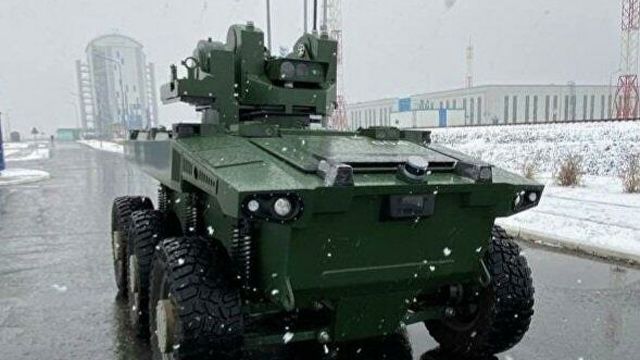Roscosmos will place special emphasis on preventing threats related to unmanned aerial vehicles
VOSTOCHNY COSMODROME /Amur Region/, October 14. /tass/. The robotic security platform "Marker" has been tested at the Vostochny cosmodrome in the Amur region. This is a step towards the introduction of automated security control at a secure facility that does not depend on the human factor, Dmitry Rogozin, Director General of Roscosmos, told reporters on Thursday.
On his Twitter, Rogozin announced the beginning of "combat duty" at the Vostochny cosmodrome of the Marker robotic security platform, designed to patrol the perimeter, intercept violators and combat drones.
"The machine [based on the Marker] that was presented today is one of the five platforms that exist. We are going to test all platforms here at the Vostochny cosmodrome, and thereby ensure, let's say, objective control over safety, which will not depend on the condition of people, the human factor, and so on. We will place special emphasis on preventing threats related to unmanned aerial vehicles," Rogozin said.
He noted that the main requirement for a security robot is to be equipped with its own unmanned aerial vehicle, which will destroy a drone that invades airspace during flight design tests. In addition, the emphasis is on autonomous control of machines.
"We generally consider the Vostochny cosmodrome as a testing ground for testing a variety of technologies. And actually rocket and space, and not only. We have very extensive industry experience working with unmanned systems in general. But, of course, the presence of an aircraft group that supports Roscosmos unmanned systems gives additional advantages," Rogozin said.
Vostochny is the first Russian civilian cosmodrome, it is located in the Amur region near the city of Tsiolkovsky (it appeared in 2015 on the site of the former village of Uglegorsk). The decree on the creation of the cosmodrome was signed by the President of the Russian Federation in 2007. As part of the first stage of construction in 2012-2016, a universal launch complex for Soyuz-2 series launch vehicles was built here. The second stage of the construction of the cosmodrome involves the construction of a launch pad for Angara-A5 launch vehicles and related infrastructure. It is assumed that the construction of the second stage will be completed at the end of 2022.

